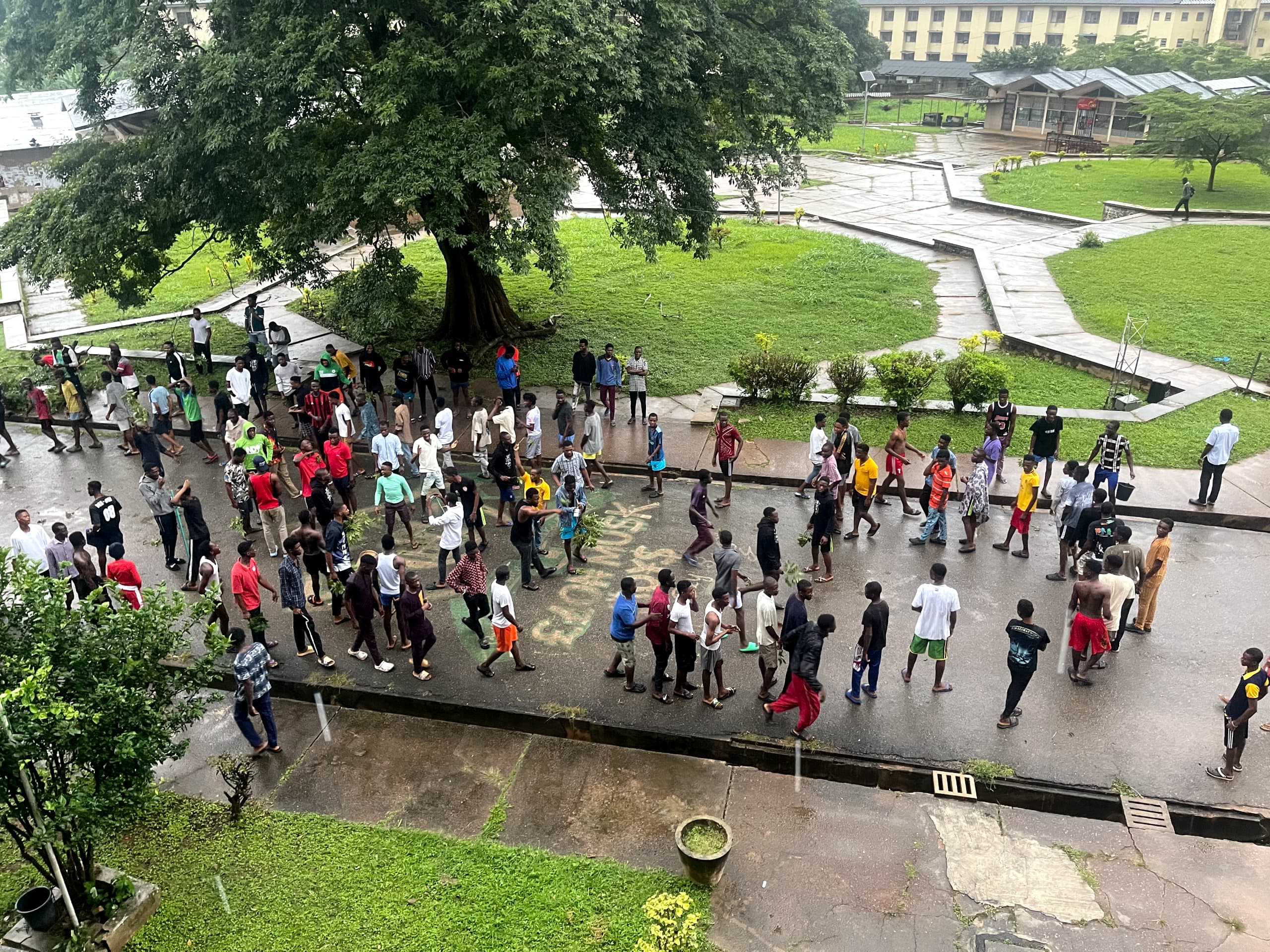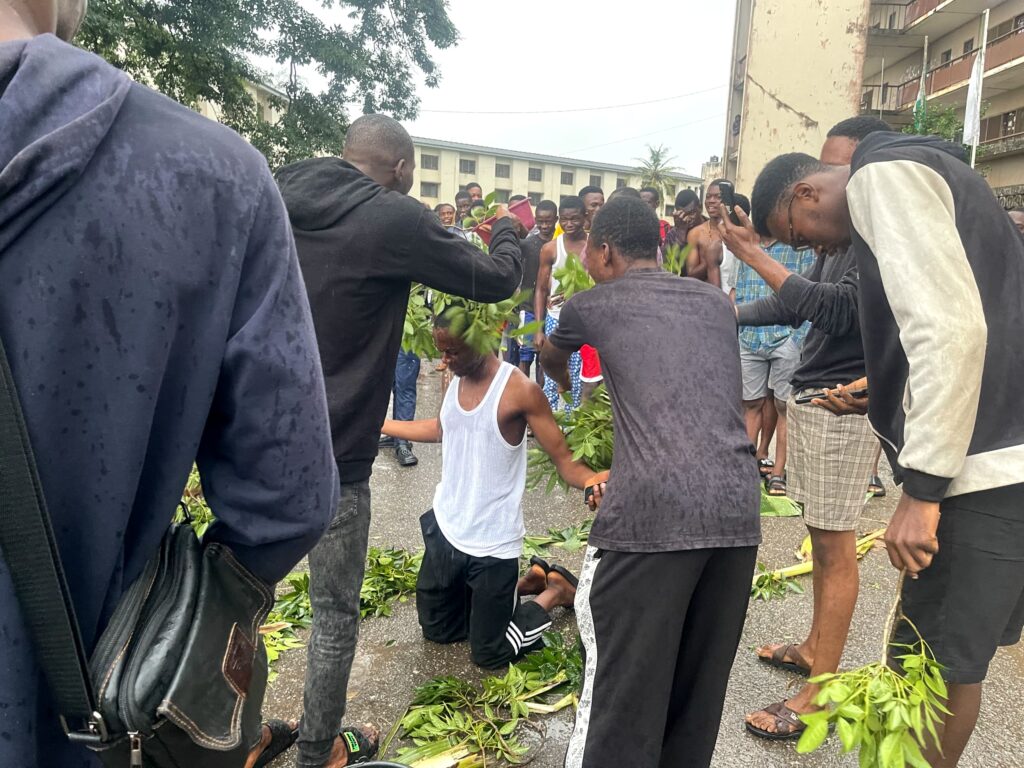Shared Traditions, Different Experiences: Understanding Hostel Baptism at UI

“It was just like any other Saturday morning; i was ill, and yet they forced me to participate. i was standing bare-chested in the cold, and yet they kept whipping me and many others with whips. Some of us felt happy and proud to be included, but all i felt was anger—anger at the system and anger at the “Elders” who had forced me into this,” recalled Tomisin*, a resident of the Great Independence Hall in the University of Ibadan, reflecting on his experience of baptism at one of the institution’s most prestigious halls. For him, the experience stirred deep discomfort and questions about the role of such traditions in student life.
Baptism or initiation into societies is not new in today’s world, as it is often used to symbolize a sense of belonging and unity. However, for male students in university of Ibadan, especially those in The Great Independence Hall and Nnamdi Azikiwe Hall, this is seen by many as a significant bonding tradition—though interpretations vary widely among students. It is more than securing a roof over their heads and identifying with a Hall; it all begins with a rite of passage known as “Baptism.” Baptism takes different forms depending on the hall a student is sorted into. For students in halls like Ransome Kuti hall, Mellanby, Bello, and Tedder, baptism is an experience that could easily be glossed over due to the lesser extent of its severity, but for male students in Zik and Indy hostels, baptism is much more serious and more enforced.
Baptism, as the name implies, usually involves dousing in water, dancing and gyration, and loud drumming. It’s 2024. imagine you’re Tomisin*, a newly admitted fresher in any of these hostels, and while you’re still in the deepest throes of sleep on an early Saturday morning, your sleep is constantly interrupted by a public address system blaring out words after words, insisting you come out for your “baptism.” You, like any other person, want to enjoy your precious morning sleep after a hectic week of lectures and go back to sleep. Suddenly your door is banged and pushed, and your precious sleep goes away. you suddenly get up, wondering who could be making such noise so early in the morning. You realize that “the elders” are at your door. Quickly you and your roommates decide to keep quiet and pretend like no one is present. they see through your tricks and threaten that you all have been marked and leave. You all breathe a sigh of relief and start making plans to escape; some of you escape, and some don’t.
You’re standing bare-chested with other freshers who were forced into it. Unfortunately, you weren’t able to escape with your roommates. You dance around a large drum while several anthems are sung. Due to your unwillingness to join the activity, you dance with less vigor around the drum, but you’re whipped time after time. Your fellow freshers are also whipped for the pettiest of reasons, like the staylites not liking how they looked.

Eventually you all file up and go through an opening made of branches and leaves after you’ve been fed propaganda like “this is the greatest hall, and you should consider yourself lucky to be here.” You’re all baptized with a bowl of water as each of you passes through the door. You think it’s all over when you’re all told to sit on the floor for a while, but you see them come with more water and pour it on you all while yelling, “bloody freshers.” It is then you begin to wonder whether the ritual still serves it’s original purpose or has taken a more disciplinary tone over time, and if expectations have started to blur the line between unity and enforcement. You are made to jog to Idia and Awo without the mercy of a shirt, chanting and singing while also trying to hide your face from the girls who found it fun enough to record so you wouldn’t end up as a meme. It all ends later that morning, and for some, they leave the experience feeling alienated rather than connected, questioning the necessity of such intensity.
This is the reality of many students in Zik and Indy halls today. Due to the nature of the baptism, which serves on the surface to make the students feel like they are part of a much bigger movement, which could have been so a long time ago, and in a way, despite this ‘treatment’ still serves the same goal. Staylites, who themselves once participated in these rituals, now urge the freshers to also do so.
This doesn’t say there aren’t people who genuinely enjoy these rites of passage. Micheal Ilenikhena, who also had his baptism in 2024 and is a student from Nnamdi Azikiwe Hall, said he actually looked forward to his baptism, and he believes it’s a bonding activity for the fresher occupants of the hostel. Some adults in charge of these hostels also believe these baptism activities should be done and be upheld as part of the culture of the hall, which makes them turn a blind eye when it happens.
Students who undergo this rarely talk openly about it, which may be due to fear and shame due to what they are forced to do during it. In Zik hostels especially, this serves to tighten the bonds they have in a hostel, and it makes them proud of being “zikites.” “We were told about the baptism days before, and I looked forward to it. On Saturday morning, we were called out; some wore their shirts, while others did not. Gyration, dancing, and passing through a shrine-like setup to certify our Zikism. We sang, took pictures, and went to Idia and Awo to sing and chant once more.” He said, before further adding “It was an interesting experience,” he said.
The question is, are these baptisms worth it? A student who fell ill days before the baptism and didn’t find ways to run away because he trusted in the people in charge to leave him to rest was forced to undergo it in the cold of the morning while being flogged with whips and soaking in cold water. Shivering during an activity that was rumored to make you feel like you would belong wouldn’t exactly make you feel “welcome.” Students in Indy who refused to participate were threatened that they would be marked and dealt with and wouldn’t get hostel accommodations the next session. They also stood at the gates to capture students who tried to run away. This comes to show that this isn’t necessarily a voluntary activity. The student who was sick got worse healthwise. Even the student who happily participated said his skin itched so much the next day. This raises important questions: how can these traditions be preserved in ways that are inclusive, respectful, and meaningful to all participants?
No one argues for the complete elimination of these initiation rituals. Instead, adopting a milder, more inclusive version where gyration, palm wine drinking, and communal activities foster genuine bonding, could significantly improve the experience. Ensuring that participation remains voluntary would transform baptism into a cherished tradition, enthusiastically passed down rather than one rooted in resentment and revenge. Continuing otherwise risks creating a culture defined by bitterness and obligation. As one student poignantly remarked, “I know some people enjoyed it. I might have enjoyed it too, but I never got the chance. To me, that day was simply punishment.”
As a new generation of students walks through the gates of these halls, the legacy they will inherit will depend on the decisions made today. Whether these initiation rituals become a source of nostalgia and pride or a dark memory they prefer to forget will be shaped by how current residents choose to respond. Tradition should never be static, it evolves, adapts and ultimately reflects the collective conscience of it’s participants. And so these halls must now ask themselves: What story do they wish their rituals to tell in years to come?
Ladapo Wisdom




